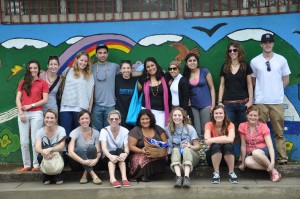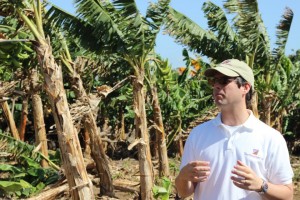 During spring break 22 Northeastern students flew to Managua, Nicaragua. This was no ordinary spring break. For three months prior this group had been researching agricultural development, specifically cooperative structures in the Social Enterprise Institute capstone course, Advanced Studies in Social Entrepreneurship. Cooperatives, both highly developed and informal, play a pivotal role in rural agricultural markets serving as a centralized system, achieving economies of scale to enhance a farmer’s income through collective buying power, pooled investments, shared risk, and greater supply capabilities for both domestic and international buyers. By forming cooperatives, individual farmers are able to come together to reap the benefits of large-scale purchasing power and also pool their production together for higher prices and distribution strategies. Ultimately, by participating in cooperatives, farmers are able to increase their income, share knowledge, and mitigate high risks inherent in agriculture.
During spring break 22 Northeastern students flew to Managua, Nicaragua. This was no ordinary spring break. For three months prior this group had been researching agricultural development, specifically cooperative structures in the Social Enterprise Institute capstone course, Advanced Studies in Social Entrepreneurship. Cooperatives, both highly developed and informal, play a pivotal role in rural agricultural markets serving as a centralized system, achieving economies of scale to enhance a farmer’s income through collective buying power, pooled investments, shared risk, and greater supply capabilities for both domestic and international buyers. By forming cooperatives, individual farmers are able to come together to reap the benefits of large-scale purchasing power and also pool their production together for higher prices and distribution strategies. Ultimately, by participating in cooperatives, farmers are able to increase their income, share knowledge, and mitigate high risks inherent in agriculture.
In March, the 22 students took to the field to apply their studies to actual fieldwork throughout Nicaragua and Costa Rica. Over one week the group visited five cooperatives meeting with farmers and management staff alongside three high performing social enterprises, Root Capital, Technoserve, and Oiko Credit, which provide financial and technical services to cooperatives and small and medium sized enterprises (SMEs).
Within Nicaragua, the group traveled to farms with Technoserve, which provides technical agroservices and training to farmers and SME’s across the agroindustry. Specifically, the students visited coffee and plantain farmers. Technoserve’s innovative model with funding from USAID improves farming practices increasing individual’s yields by up to 1000%. Most impressive, on the second farm, students reported seeing a farmer drastically improve his plantain yields through Technoserve’s technical training in graphing techniques, seedling spacing, irrigation techniques, harvesting practices, and market access.
 After three days in Nicaragua the group traveled across the boarder to Costa Rica. This was an enriching experience for students to contrast the political and socioeconomic conditions between the second poorest country in the Western Hemisphere to Costa Rica, which has the highest GINI and Human Development Index in Latin America. Over three days in Costa Rica, the class traveled alongside Root Capital, which provides trade credit and long term loans to export cooperatives and Oiko Credit, a financial institution which finances MFI’s as well as cooperatives. In Costa Rica, the students were able to speak with managers of well-developed cooperatives and producer associations, which export millions of dollars of high quality coffee to large intermediaries and buyers such as Starbucks and Sustainable Harvest.
After three days in Nicaragua the group traveled across the boarder to Costa Rica. This was an enriching experience for students to contrast the political and socioeconomic conditions between the second poorest country in the Western Hemisphere to Costa Rica, which has the highest GINI and Human Development Index in Latin America. Over three days in Costa Rica, the class traveled alongside Root Capital, which provides trade credit and long term loans to export cooperatives and Oiko Credit, a financial institution which finances MFI’s as well as cooperatives. In Costa Rica, the students were able to speak with managers of well-developed cooperatives and producer associations, which export millions of dollars of high quality coffee to large intermediaries and buyers such as Starbucks and Sustainable Harvest.
In addition to exploring the production constraints and capabilities, structures, labor/export requirements, and financing needs, the students also worked with the cooperatives to gain information about their social programs and services for their members and also communities In January, the Social Enterprise Institute was granted a $10,000 Barker Foundation grant which will provide funding for the social program deemed to be most impactful and sustainable.
Applications for the grant were due April 5th and will be awarded at the beginning of June by the students of the course, made possibly by the Barker Foundation. Stay tuned for updates on the progress of the grant and its funded social program!


